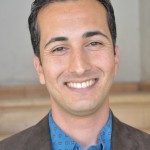By Shukry Cattan
Shukry has spent ten years working in the Los Angeles nonprofit sector, providing direct services to refugees and building a strong Arab American community. He has spent time in the Middle East assisting Palestinian refugee youth and is involved in interfaith dialogues between Muslims and Jews.
After 50 days of war in the Gaza Strip, the violence temporarily has been halted, but the conflict between Palestinians and Israelis continues. More than 2,100 Palestinians were killed and 65 soldiers and four civilians have died on the Israeli side. The level of destruction to infrastructure in the Gaza Strip is unimaginable, leaving over 100,000 Palestinians internally displaced whose homes were destroyed and will take several years to rebuild.
What was it all for? As a Palestinian American, living in Los Angeles, I often ask myself this question and search for answers through twitter updates and Facebook posts. The personal accounts of individuals on social media give me a closer connection to the conflict rather than relying on the biased interpretations of mainstream media. Unfortunately, social media with 140 character sound bites has turned into a battleground to win hearts and minds over the conflict providing limited opportunities for constructive dialogue. The most disheartening aspect of social media has been the lack of focus to address this conflict as attention moves to other tragedies in the world.
Palestinian resistance is often romanticized by many progressive groups as one of the greatest examples of oppressed people overcoming a powerful foe. This view of always being in opposition can prevent the people of Palestine from beginning to live normal lives and who are desperately looking for a way to end their resistance. The Palestinians need to end the Israeli occupation of its territories to restore civil order in their society and develop economic security. We need to think beyond resistance and rebuild the confidence of the people. The period of time between wars are critical for advancing non-violent movements against the occupation, but it is during these times that people tend to lose interest or give up hope. So, if activists continue to push for only justice during periods of war and violence, the messaging for a peaceful solution in the region will be lost. Now is a critical time for allies and supporters to engage with Palestinians during their recovery and to foster a permanent reconstruction for the people living in Gaza.
Although still debated and highly overlooked, I think the most logical step for Palestine and Israel is to co-exist as two sustainable states. How else could Palestinians have a single state that includes the Gaza Strip and West Bank? These two territories are inseparable and should not be viewed as different states or people. It is also important to recognize the diversity and cultural complexity of the Palestinians in their ideologies, faith and culture. An education of Palestinian political resistance is important for all Americans to understand, but that must be coupled with a deeper knowledge of the people are without removing their humanity.
Solidarity for Palestine must be rooted in empowerment and not only in its resistance. The suffering of Palestinians is tied to the system of occupation and apartheid that governs the West Bank and the economic blockade of the Gaza Strip by Israel and Egypt. This suffering must end, but a plan for a strong Palestinian state must be considered in this equation. What will that look like? What method of governing will the Palestinians pursue? This, of course, is an internal dialogue for Palestinians, but there is a lot that can be gained with the support from allies to nurture this conversation. The constant state of resistance will only strengthen the presence of groups like Hamas and Fatah who are both corrupt. These political parties use the resistance narrative as a tool to maintain their ruling powers over the “Palestinian cause”. Israel’s policy to defend itself continues to dehumanize and abuse the Palestinians, leaving them no choice but to resist. Dismantling or replacing these policies will provide Palestinians with more spaces for internal debates regarding their future state and society.
In 2005, Palestinian civil society issued a call for a campaign to boycott, divest and sanction (BDS) Israel until it complied with international law and Palestinian rights. This global movement against Israeli apartheid has galvanized many people to end the suffering of Palestinians using non-violent means. The Palestinian BDS National Committee (BNC) is a coalition of Palestinian organizations, trade unions, networks and NGOs that have been successful with putting pressure on the Israeli government. Jewish groups have also joined this campaign and more could support it if the messaging included how ending a system of apartheid in the Palestinian territories will empower the people to develop stronger social and political institutions.
I believe the BDS movement is an important non-violent movement aimed at ending the occupation. The messaging should be focused more on the system of occupation rather than a call to act against Israel. We must consider the Israelis in any action taken since the ultimate goal is co-existence between these two people. Applying pressure on Israeli policies and holding their military accountable is important to preserve Israeli democracy and to disarm the war hawks that defend the need to answer conflicts with violence. The current governing parties of Palestinian territories must also be held accountable, but that only can be achieved when a sense of Palestinian empowerment is developed in the consciousness of the people. All forms of non-violent actions must be used and BDS has been an excellent vehicle towards fostering this type of movement while constantly reevaluating its strategy.
US activists have the tools, methods and history of non-violence to promote these actions and instill a sense of empowerment in the Palestinian people. The movement must build the lives of individuals and provide them with opportunities that create stronger family households, restore educational institutions for children and provide a space for Palestinians to freely discuss and criticize both Israeli and Palestinian political systems.
Palestinians need to find their voice and identity as a people outside of resistance and political circumstances. We are not numbers. We are not dead children. We are a people who have been denied the right to exist as a nation, but more than that, to live as human beings. American progressives should recognize that our story as an independent and free nation has not truly started; we are still fighting for the first page to be written.
Resistance against occupation and discrimination is not who Palestinians are, it is what we do to become something greater.





